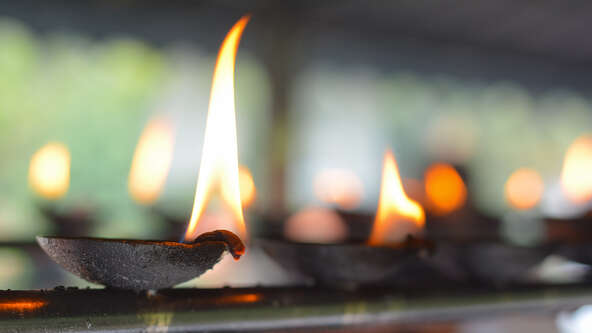How Different Religions View Cremation and Honor Their Loved Ones

When someone we love passes away, religious and cultural traditions can offer comfort, structure, and meaning. Whether you’re planning ahead or navigating a recent loss, it helps to understand how different faiths view death. As more Americans choose cremation over burial, it is also helpful to know how many religions accept cremation.
Direct cremation is a simple, affordable option chosen by many families today. While some religious traditions historically preferred burial, a growing number now accept cremation, as long as it respects the dignity of the deceased and includes the opportunity for prayer, ritual, or spiritual reflection.
Below, we explore how different religions honor the dead and examine the role of cremation within these customs.
Buddhism
Buddhists believe the body is temporary and the soul is reborn. Cremation is widely accepted, and ceremonies focus on guiding the soul toward a peaceful rebirth.
- The “powa” ceremony helps transfer consciousness after death.
- Offerings such as flowers, candles, incense, and food are placed on an altar to honor the Buddha and create a peaceful space for prayer, reflection, and positive karma.
- Ceremonies can occur before or after cremation and are often held in temples or homes.
Catholicism
Catholics believe in eternal life and traditionally preferred burial, but today, the Church allows cremation as long as it’s not chosen for reasons contrary to Christian beliefs.
- When possible, the Sacrament of the Sick is offered before death.
- A funeral Mass or service is held, even if cremation takes place afterward.
- Cremated remains should be buried or placed in a sacred location.
Christianity (Non-Catholic)
Christian beliefs around death and cremation vary by denomination, but most accept cremation as long as it's carried out with dignity and reverence.
- Many Christian funerals include a memorial service or celebration of life.
- Cremated remains may be buried, placed in a columbarium, or kept at home, depending on beliefs.
- Scripture readings, hymns, and prayers are often included in memorial gatherings.
Hinduism
Hindus believe that the body is made of five elements – earth, water, fire, air, and space – and cremation returns the body to those elements. Fire, a sacred force in Hindu rituals, is the preferred method of releasing the soul.
- Cremation is customary and typically occurs soon after death.
- Families often witness or participate in the cremation, sometimes pressing the button to initiate the process.
- For 12 days after death, families observe rituals to help the soul transition. The 13th day is a celebration of the soul’s journey.
Islam
Islam emphasizes cleanliness, humility, and preparation of the body for burial. Cremation is generally not permitted in Islamic tradition.
- The body is washed, wrapped in a white cloth, and buried with its face facing Mecca.
- Prayers and rituals are performed quickly, usually within 24 hours of death.
- The community gathers to support the grieving family.
Jainism
Jains treat the body with simplicity and respect, focusing on the soul’s release rather than outward expressions of grief. Their beliefs in non-violence and detachment shape every part of the farewell.
- Cremation typically happens within 24 hours to avoid harm to microorganisms in the earth.
- Family members gently bathe the body and wrap it in a plain white cloth.
- Mourners avoid elaborate displays and instead focus on quiet reflection and prayer.
- The focus remains on freeing the soul and embracing spiritual purity.
Judaism
Judaism traditionally favors burial as a means of returning the body to the earth. However, cremation is becoming more common, especially among Reform and secular Jews.
- The body is treated with dignity and often buried quickly.
- Mourners observe “shiva” for seven days, then “shloshim” (30 days of mourning).
- Rituals focus on honoring life and offering comfort to the living.
Sikhism
Sikhs accept death as part of God’s will and honor the life of the person with prayer and community support. Funeral traditions center on humility, remembrance, and faith.
- The family bathes and dresses the body in simple, clean clothes.
- Cremation is usually performed shortly after death.
- Loved ones recite prayers from the Guru Granth Sahib throughout the rites.
- The community gathers again around the tenth day for the *bhog*, a final prayer service marking the soul’s journey onward.
Spiritual or Religious Ceremonies After Simple Cremation
Even if you choose cremation services for their simplicity and cost-effectiveness, you don’t have to give up the rituals that matter most. Here are a few meaningful ways to honor your loved one’s faith:
- Host a memorial service at a church, synagogue, temple, or mosque
- Invite clergy or spiritual leaders to speak at a celebration of life
- Include scripture readings, hymns, chants, or prayers
- Plan a graveside or niche interment ceremony
- Share cultural or religious food and traditions
- Plant a memorial tree in their honor
Your Farewell Should Reflect Your Beliefs
Every faith tradition approaches death differently, but most share a common goal: to help the living mourn and bid farewell to loved ones. Whether your family chooses burial, cremation, or another option, you can still incorporate meaningful religious or spiritual rituals that provide peace and healing.
For more personalized guidance, speak with your local clergy, funeral director, or cremation provider to ensure your wishes and beliefs are honored.